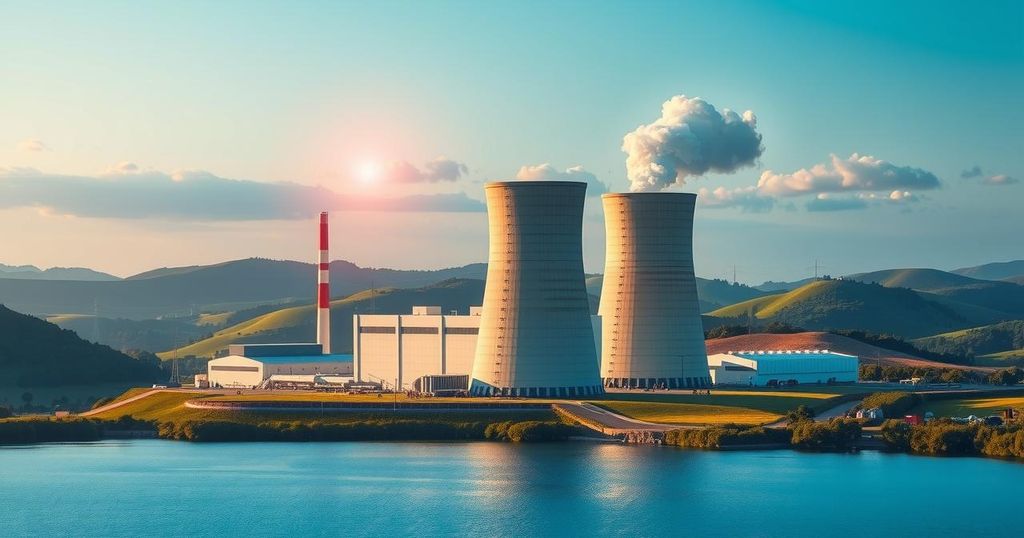Germany Reconsiders Nuclear Energy Amid Rising Energy Costs and Election Campaigns

Germany is reconsidering nuclear energy, with the conservative CDU advocating its revival ahead of elections amid rising energy costs and reliance on Russian gas. Proponents call for research into small modular reactors, while others express safety and feasibility concerns amidst urgent energy demands. This debate raises questions about Germany’s broader energy strategy and the role of nuclear power in achieving climate goals.
Germany is reigniting its debate on nuclear energy just two years after closing its last reactor. With the conservative Christian Democrats at the forefront, there is a push to revive atomic power ahead of the February 23 election. The debate is fueled by rising energy prices and Germany’s dependence on Russian gas, particularly following the invasion of Ukraine in 2022, which has pressured industrial operations and competitiveness.
The German government previously committed to phasing out nuclear power after the Fukushima disaster in 2011. However, the current economic landscape is prompting reevaluation. Jens Spahn, deputy parliamentary leader of the Christian Democratic Union (CDU), emphasized that retaining nuclear power options is vital to meet increasing energy demands in the digital age, pointing towards the development of small modular reactors (SMRs) as a future solution.
The CDU and its Bavarian ally, the Christian Social Union, pledge to prioritize nuclear energy in their election platform, advocating for more research into advanced nuclear technologies. Friedrich Merz, the leader of the CDU, has suggested potential collaboration with France on developing SMRs. The Free Democratic Party (FDP) appears receptive to nuclear exploration, while the far-right Alternative for Germany (AfD) seeks to reverse the nuclear exit entirely.
Resistance to nuclear revival is notable, with significant apprehensions regarding the untested nature of SMRs, including concerns about costs and feasibility. Nonetheless, advocates like Rafael Laguna de la Vera, head of Sprind, stress the importance of reentering the nuclear arena to seize industrial opportunities, declaring that “Germany must not miss out on this important industrial revolution in the coming years.”
Opponents highlight that SMRs remain largely unproven, raising questions about their safety and efficiency. The conversation around nuclear energy underscores contradictions within Germany’s energy policy, with the European Commission recognizing its role in the EU’s energy transition, while other nations, such as the U.S. and China, invest heavily in SMR technology development. The push for nuclear is seen as a response to the limitations of relying solely on renewable energy sources, which constituted 62% of Germany’s public electricity generation last year.
Experts like Laguna caution that Germany cannot satisfy future energy demands exclusively through renewable sources, such as wind and solar power, if it hopes to achieve its climate goals. The current situation emphasizes the urgent need for a balanced and viable energy strategy that addresses both supply challenges and sustainability in the years to come.
The nuclear debate in Germany has intensified following significant global events and rising energy costs. Germany had committed to a nuclear phase-out after the 2011 Fukushima disaster, favoring renewable energy. However, the geopolitical tensions stemming from Russia’s invasion of Ukraine and subsequent energy crises have compelled a reassessment of this strategy. The resurgence of interest in nuclear power, particularly with the advent of new technologies such as small modular reactors (SMRs), highlights the ongoing challenges faced by Germany’s energy policy.
Germany’s nuclear energy debate is resurfacing as a critical election issue, driven by concerns over energy security and costs. While proponents argue for the revitalization of nuclear power options, notably SMRs, they confront resistance concerning the safety and viability of these technologies. This pivotal moment underscores the need for Germany to navigate its energy policy effectively amidst changing global dynamics and domestic pressures.
Original Source: www.politico.eu








